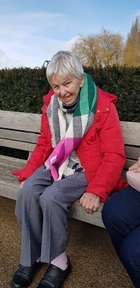87-year-old with dementia forgets daughter but knows every word to Remembrance hymn
An eighty-seven-year-old with dementia can’t remember who her daughter is, but she does know all the words to the patriotic Remembrance hymn ‘I Vow to Thee, My Country’.

On being reminded it is Remembrance Sunday on the weekend, Grandmother Pat French gave a touching rendition of the hymn written in the final year of the First World War. The song refers to the ‘love that never falters, the love that pays the price, the love that makes undaunted the final sacrifice’.
Pat French was with her caregiver Barbara Marchant from Home Instead (Bedford) when she sang the hymn.
Ms Marchant, who lost her own mum to dementia, said: “To see Pat start singing the hymn was incredibly moving and very emotional, showing the true impact music has on helping recall memories and feelings from the past.
“Dementia is a cruel, cruel disease, both to the person and to their family. I have seen dementia rob Pat of so much which is why it’s so joyous that music can help lift her – it means I can see a little bit of the ‘old her’. We love singing together and she lights up when she sings which just melts my heart.”
Ms French was a child during World War 2 and says she can still ‘remember clearly’ the air raid sirens and how frightened she felt.
Studies have found that music can have a huge impact on people with dementia, having a calming effect and reducing anxiety and agitation. It also enables them to reconnect with memories, making it an incredibly therapeutic activity.
Even when many memories are hard to retrieve, music is especially easy to recall.
Pat French’s daughter, Emma Muncaster, said: “Although she can’t often remember who I am, she can remember all of the words to her favourite songs which is incredible.
“Music calms mum down when she is agitated, and she sings along for ages. She used to be in a choral society and so singing takes her back to those happy times and we treasure the happy moments singing along with her.”
Previous research has suggested that singing can reach parts of the damaged brain in ways other forms of communication cannot. Professor Paul Robertson, a concert violinist and academic who has made a study of music in dementia care, says: “We tend to remain contactable as musical beings on some level right up to the very end of life. We know that the auditory system of the brain is the first to fully function at 16 weeks, which means that you are musically receptive long before anything else. So it’s a case of first in last out when it comes to a dementia-type breakdown of memory.”
Home Instead Senior Care, a home care provider specialising in dementia care, recently launched #SongsToRemember – a national campaign raising awareness of the therapeutic benefits of music for people living with dementia.
Latest News
 29-Jul-24
Dementia Bus gives carehome.co.uk staff insight into life with dementia
29-Jul-24
Dementia Bus gives carehome.co.uk staff insight into life with dementia
 27-Jul-23
UK's top home care agencies in 2023 revealed
27-Jul-23
UK's top home care agencies in 2023 revealed
 30-Nov-22
A quarter of older people keep their falls secret from family
30-Nov-22
A quarter of older people keep their falls secret from family
 29-Nov-22
'Covid-19 has not gone away' say terminally ill
29-Nov-22
'Covid-19 has not gone away' say terminally ill
 28-Nov-22
IT consultant who received poor care opens 'compassionate' home care business
28-Nov-22
IT consultant who received poor care opens 'compassionate' home care business